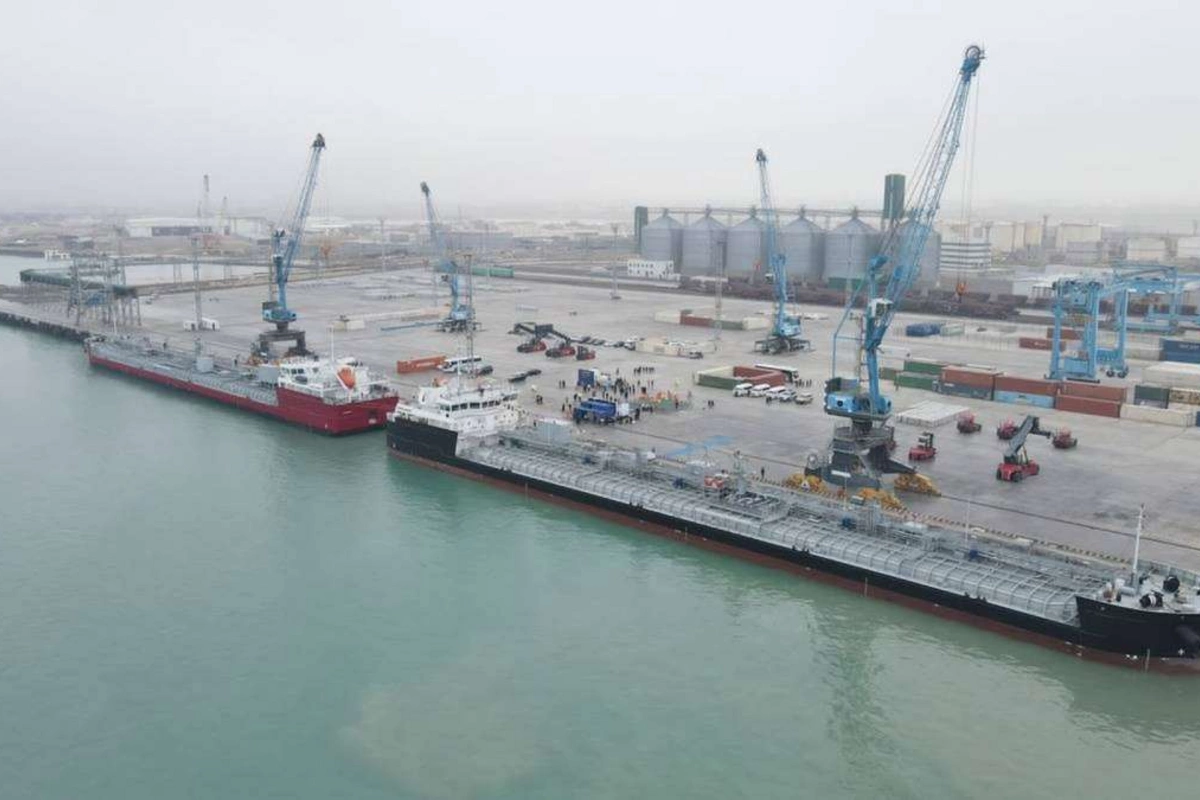
In 2022, Kazakhstan’s KazMunayGas (KMG) and Azerbaijan’s SOCAR signed an agreement to transport oil through the Baku (Azerbaijan)—Tbilisi (Georgia)—Ceyhan (Türkiye) pipeline. The pipeline, stretching 1,768 kilometers, connects the Sangachal terminal on the Caspian Sea to the Ceyhan marine terminal on Türkiye’s Mediterranean coast.
Aktau International Sea Trade Port. Photo credit: The press service of the akim of the Mangystau region
Kazakhstan’s oil exports are expanding, but the cost of transporting oil via the BTC pipeline is higher compared to existing routes like the Caspian Pipeline Consortium (CPC), The Caspian Post reports citing Astana Times.
These remarks follow Kazakhstan’s announcement of plans to expand its oil transportation network. The country announced it will increase exports via the BTC pipeline from 1.5 million tons in 2024 to 20 million tons annually in the coming years.
In 2022, Kazakhstan’s KazMunayGas (KMG) and Azerbaijan’s SOCAR signed an agreement to transport oil through the Baku (Azerbaijan)—Tbilisi (Georgia)—Ceyhan (Türkiye) pipeline. The pipeline, stretching 1,768 kilometers, connects the Sangachal terminal on the Caspian Sea to the Ceyhan marine terminal on Türkiye’s Mediterranean coast. In 2023, Kazakhstan shipped slightly over one million tons of oil through BTC, according to the Kazakh Energy Ministry.
“Kazakhstan exports 70% of its total oil production, of which 98% is sent via two routes – the Caspian Pipeline Consortium and the Uzen – Atyrau – Samara oil pipeline. This creates a high dependence on one country and great risks in case of escalation of conflict in the region,” said oil and gas analyst Abzal Narymbetov, as quoted by Kazinform news agency.
The CPC pipeline, which links oil from Kazakhstan’s Tengiz oil field to Novorossiysk on the Russian coast of the Black Sea, is one of Kazakhstan’s main export links, transporting over two-thirds of all export oil.
Narymbetov noted that in 2022, operations at the CPC were repeatedly suspended, compelling Kazakhstan to scale back production at major oil fields to prevent overstocking. The expert highlighted the BTC oil pipeline as a crucial alternative, as it entirely bypasses Russia. With a capacity of up to 60 million tons per year, he said the pipeline remains significantly underutilized, operating at less than half its potential.
“Azerbaijan’s oil production is declining while domestic consumption is growing. Kazakhstan has an opportunity to occupy the vacated capacities. Deliveries via BTC will reduce dependence on Russian routes,” said Narymbetov.
One challenge is that oil transportation via BTC is three times more expensive—at around $120 per ton against $38 via CPC. To boost oil export capacity at a lower cost, the country would need to undertake infrastructure expansion projects at its Aktau port.
“The main problem is the delivery of oil to Baku. From the fields, it is transported by tankers to Aktau, then by tankers shipped across the Caspian Sea. This is a time-consuming process that incurs storage and waiting costs. Expanding supplies to 20 million tons will require infrastructure upgrades. Today, the port of Aktau can handle only five to six million tons of oil per year. The port’s capacity will have to be expanded three times to increase volumes, and additional storage and loading terminals will have to be built. This will require significant capital investments,” said Narymbetov.
An alternative to reducing costs would be constructing an oil pipeline beneath the Caspian Sea. However, it is complicated by the legal issues surrounding the Caspian Sea, which is shared by five states.
“Without an agreement between the five Caspian littoral states, the construction of an oil pipeline is impossible. Therefore, Kazakhstan is left to rely on tanker transportation, which significantly increases costs,” said Narymbetov.
Narymbetov suggested that despite the high costs, with Kazakh oil flowing through Russia’s territory, the country needs to develop alternative routes for oil exports to balance geopolitical risks.
“Ninety-eight percent of our exports pass through the territory of Russia. If transit along these routes is suspended, Kazakhstan’s economy will be in a difficult situation. The country’s budget is half dependent on oil and gas revenues, and 60% of export proceeds are related to oil sales. The development of the BTC route is a way to reduce risks and protect the economy from possible shocks,” said Narymbetov.
On the other hand, Rashid Zhaksylykov, chairman of the Presidium of the KazService Association of Oil Service Companies, said that the CPC route remains the only cost-effective option in the short term.
“No route that we could offer or implement would be more profitable than the CPC. Of course, we are pushed by an external factor – threats from Russia, when they start discussing the closure of the CPC. But every pipeline has its real capacity. For example, the Caspian pipeline can pass up to 80 million tons of oil per year, and even if nothing happens there, we will continue to supply oil,” Zhaksylykov told Kazinform.
According to him, only higher oil prices would justify using the BTC route.
“If oil will cost below $40 per barrel, then deliveries through Baku will be economically unreasonable. However, if the price of oil was $70-80, then deliveries through Baku would become profitable for Kazakhstan. Ultimately, everything depends on the price pressure in the market,” said Zhaksylykov.
This year, between January and October, Kazakhstan transported 1.2 million tons of oil through the Baku-Tbilisi-Ceyhan pipeline.
Share on social media